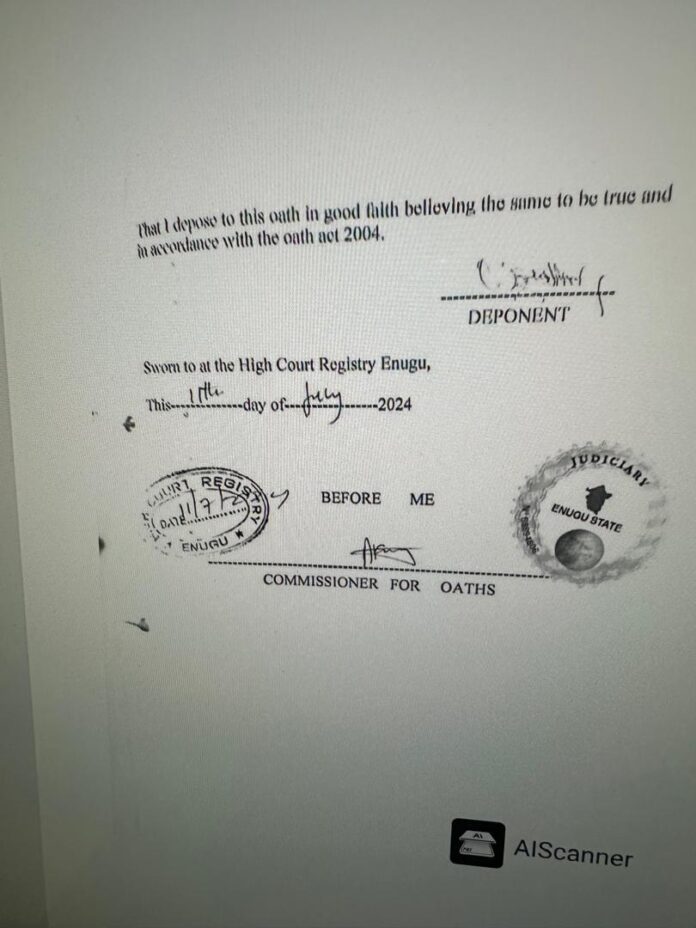N2 billion scandal rocks Women Affairs Ministry
**Civil Society Organisations Ask court to compel Women Affairs Minister to account for $100M World Bank Intervention Funds for Nigerian Women
The Minister of Women Affairs, Mrs Uju Ken Ohanenye, is again in the eyes of the storm as she was accused of siphoning N2billion meant for the empowerment of the women in the country.
Already, a group, identified as Concerned Civil Society Organisations (CSOs) has dragged Ohanenye and President Bola Ahmed Tinubu to an Enugu High Court, seeking an order of the court compelling the minister to account for the whooping N2billion.
The plaintiffs in the case- Ambassador Onyinye Joy Mamah, suing for herself and on behalf of Heroine Women Foundation and Other Affected Nigerian Women and Amaka-Ajuzie Ogbu, for herself and on behalf of Net Bridge Empowerment Foundation, are asking Ohanenye to also account for $100M intervention funds granted to the ministry by the World Bank in aid of distressed Nigerian women.
The petitioners on behalf of themselves and Nigerian women expressed disappointment at the minister for siphoning intervention funds meant for the emancipation of the Nigerian women.
The petitioners said various actions of the Women Affairs ministry by Ohanenye raised serious questions about the management of funds meant for vulnerable Nigerian women and and children.
They described the minister’s application of the various intervention funds available to the ministry as not only flawed but exploitative.
They demanded that Ohanenye provide a full and transparent account of how N2billion was utilised.
Similarly, they requested the anti-graft agency to investigate and hold Ohanenye accountable for the misuse of public funds under her custody.
The petitioners said, “Over the years, the minister has diverted an estimated N2billion from various critical projects within her ministry under the guise of empowerment into questionable initiatives. The minister allegedly appoints the contractors for these initiatives, raising further concerns about transparency and accountability.”
“We highlight the following examples of these so called empowerment projects: Purchase of Keke tricycles: The minister has proudly touted the purchase of just seven tricycles for women, from she now demands daily payments.”
“Purchase of Iron dubbed Steaming Machines and scissors dubbed cutting machines at exorbitant rates of N680,000 per iron and N160,000 naira per scissors.”
“Faceless Benefiaries: A significant number of beneficiaries of these initiatives remain unidentified, leading us to question whether these individuals even exist or if the funds have been misappropriated.”
“Furthermore, we are in possession of a Memorandum of Understanding (MoU) signed by the minister with organizers of an event which she recently disrupted claiming ignorance of the event.”
“The organisers alleged that the minister reneged on the alleged revenue sharing formula few days to the event after they have had committed substantial funds to the event. They were then threatened with disruption unless they complied with her new terms. This type of extortionate behavior is unacceptable and undermines the credibility of the ministry.”
“We demand that the Minister of Women Affairs provide a full and transparent account of how the N2billion was utilised. It’s imperative that the funds allocated for the empowerment of women are used for their purpose and not as a tool for personal enrichment.”
“We call on relevant authorities to conduct a thorough investigation into the minister’s activities and hold her accountable for any misuse of public funds. The time has come to put an end to the exploitation of women and children under the guise of empowerment.”
Meanwhile, in the affidavit sworn to by Mamah and Ogbu, at Enugu High Court, they deposed that, “Not long ago during the regime of former President Muhammadu Buhari, a loan facility amounting to N100billion had been made available to this country by World Bank for use to better the lives of women.”
“The fund was wholly dissipated and none had gotten to the end users, i.e. the impoverished women of Nigeria, all that they heard was that the whole of N100M had been spent on consultancies, seminars and such other inanities.”












